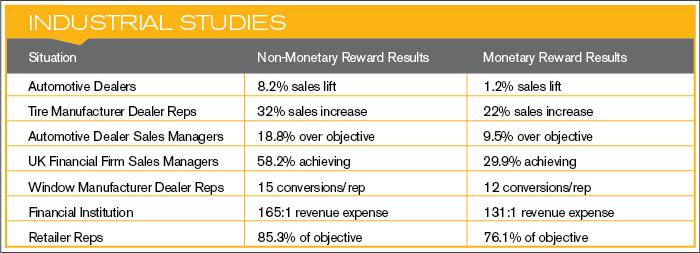If you lead with emotion, sales performance will follow
Written by: William Johnson
(View Author Bio)
Money may talk, but you need a lot of it to change behaviour. Learn how to leverage cash and non-cash incentives to increase sales performance.
Scroll Down
__________
In the multi-billion-dollar field of sales compensation programs, there is one topic that seems to generate more research, debate, and division than all others: What is the most effective approach to sales rewards and incentives — cash or non-cash? In other words, will your salespeople work harder to earn a cash bonus or award points to use on tangible awards?
__________
The reasoning behind a cash-based rewards program appears quite simple and rational: reward increased sales performance with more money. A non-cash program rewards increased sales performance with award points. As the award points accumulate, they are redeemable for merchandise, experiences, or travel.
The interesting thing is your sales force may say they want the extra money, but the reality is somewhat different. Numerous academic studies have proven people will actually work harder to earn tangible items. But why?
It’s because of behavioural economics. At BI WORLDWIDE Canada, we use the principles of behavioural economics to incentivize behaviour change and deliver measurable results. What is behavioural economics? It’s when rational thought and emotions combine to drive decisions and behaviour.
In the 1980s, North American economic professors began to question classical economic theories as they relate to individuals. This led to the creation of behavioural economics, with the focus on how people actually behave rather than how classical economic theories predict they will.
Today, this growing field of study has proven what we have always known on an intuitive level: people are often inconsistent and irrational in the actions they take. On the surface, it would seem the rational response from a commission-based sales force would be to work harder for a cash reward. After all, their occupation is based on the concept of being monetarily compensated for a job well done. But as the graphics below indicate, sales teams in several academic studies and across a wide range of industries made the seemingly irrational choice — they performed significantly higher when they were rewarded with non-cash incentives.


These examples prove what’s at the heart of behavioural economics: The majority of behaviour is driven by emotion (77%) versus reason (23%).
This behaviour is explained by the primary consideration for cash — it disappears into day-to-day necessities. Any extra money earned is first used to meet basic living expenses and pay bills. (That’s behaviour driven by reason.) Only after those needs are taken care of do we let our emotions take over to think about using them on things we want or desire. Because paying our bills or buying gas and groceries drains the emotion out of the reward, money ends up being a less efficient motivator.
As you consider the impact this has on the sales rewards and incentives you use with your sales teams, tap into what makes points more effective than cash. They put people who earn them into an emotional mindset focused on dreams and possibilities, eliciting the type of performance that moves a business forward.
Remember, money may talk but you need a lot of it to change behaviour.
The best way to get started is to get in touch.
















